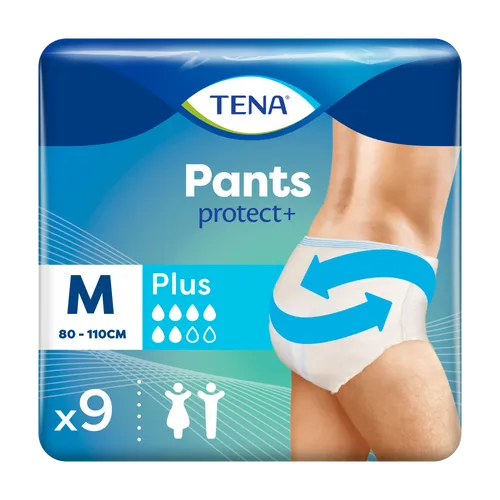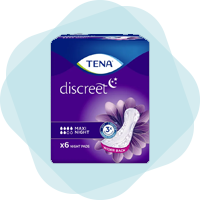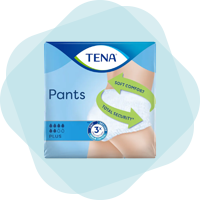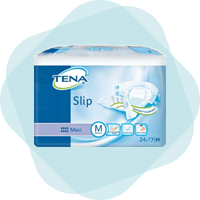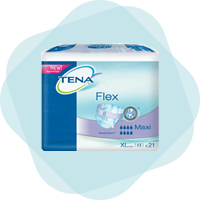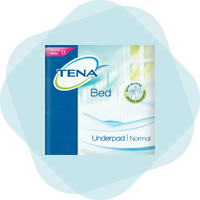
Feel dry, secure & protected with TENA's discreet range incontinence products

About TENA
TENA are the worldwide leader in the management of incontinence boasting more than 50 years' experience in the field. They provide products and services for individuals and healthcare services throughout 90 countries. TENA are committed to developing products and services that will minimise the impact of incontinence on everyday lives.
TENA is dedicated to the idea that incontinence shouldn't stop people from leading a full and happy life. Providing incontinence pads & products to people of all ages to continue to live an active life
Trusted by millions, TENA helps people stay secure, dry and odour free. We are the global leader, offering products that help manage urinary incontinence, leakage and bladder weakness, day and night. For over 60 years we've been creating discreet feminine pads, underwear and pants, masculine shields and other effective solutions for this surprisingly common problem. By doing so, people of all ages the world over, can continue to enjoy the active, fulfilling life they deserve.
TENA Bestsellers
-
TENA Men Level 3 Pack of 8 £4.49 save £0.01
-
TENA ProSkin Plastic-Free Wet Wipes Pack of 48 £3.49 save £0.06
-
TENA Discreet Protect+ Maxi Night Duo Pack of 6 (12) £4.35 save £0.40
-
TENA Pants Protect+ Plus Medium Pack of 9 £7.40 save £1.60
What is bladder weakness and what are the causes?
Bladder weakness occurs when the bladder leaks involuntarily. The bladder can empty completely or just leak small quantities of urine at certain times.
As well as being surprisingly common, incontinence can be irrespective of age or overall health, and can often happen to people in the prime of their lives. Bladder weakness is a subject which tends to have a stigma attached to it, which may cause people to be embarrassed and not get help on how to manage it.
This means that many people do not receive the support and advice that could significantly improve their lives.
Bladder weakness is twice as common in women as it is in men; although, both can develop bladder weakness at any age. It can be caused by issues such as obesity, neurological conditions, certain medications or any disease, condition or injury that damages nerves (e.g. neurological injury, long-term diabetes, stroke, Parkinson's disease and multiple sclerosis).
Pregnancy
During pregnancy, women may experience stress incontinence due to an increased pressure on the bladder and pelvic floor, or urge incontinence due to the bladder muscles contracting too early.
In addition, the hormone relaxin softens the pelvic floor muscles to prepare for the baby's birth, which can also contribute.
Menopause
In women, the hormone oestrogen helps to keep the bladder and urethra healthy. During and following the menopause, the level of oestrogen significantly reduces, which can cause the pelvic floor muscles to weaken, resulting in bladder weakness in the form of stress incontinence, urge incontinence and/or nocturia.
Obesity
Obesity puts added pressure on the stomach, which then increases pressure on the bladder and urethra. The pelvic floor muscles can't cope with this extra pressure and are subsequently unable to prevent urine flowing from the bladder.
Obese individuals may also experience urine leakage when they sneeze, cough, laugh or have sex.
Men
Prostate problems are the most common cause of urine leakage in men. The prostate surrounds the urethra and can enlarge as a man ages and cause BPH.
The prostate may cause reduced urine flow in men as the urethra is 'closed off' due to the enlarged prostate wrapping around it.
If surgical removal of the prostate is required during treatment for BPH or prostate cancer, it can cause damage to the sphincter muscle that keeps the bladder closed and cause stress incontinence.
Night-Time
The need to pass urine during the night is called nocturia and there are several possible causes. When we age, less anti-diuretic hormone is produced, which is needed to help the body retain fluid at night.
Bladder infections can also cause nocturia, as well as medical conditions such as heart problems or diabetes. Other possible causes include drinking too much fluid - especially before bed or sleep-related problems.
Incontinence Myth Busting
As well as being surprisingly common, incontinence can happen to people in the prime of their lives, irrespective of their age or overall health. And incontinence affects different people in different ways.
It may not be an especially serious condition in itself, but the perceived social taboo around incontinence can harm a person's social confidence.
We also know that incontinence can make sufferers feel anxious and isolated, and that carers often find themselves wanting to help loved ones maintain their dignity, while professionals have to juggle budgeting issues with the desire to offer the highest standard of care.
Incontinence is a normal part of getting older
Male incontinence is not inevitable and many will never experience the condition. For quite a few of those who do, it will only be temporary.
Even if you have incontinence in any form there are many ways to control it. If you start noticing symptoms, visit your GP for advice. Bladder weakness is very common.
In fact, one in three women over 35 experience involuntary urine leakage.
It only affects older people
This myth makes younger guys feel even worse about themselves.
Incontinence can be the result of many conditions or life habits.
For example, anxiety, obesity, smoking, excess caffeine or alcohol, and prostate problems can all lead to incontinence problems.
You should drink less to stop leaks
It's very important to stay hydrated and if you cut down on your fluid intake your urine becomes too concentrated, causing irritation in the bladder.
However, it's best to avoid drinks with alcohol or caffeine.
It's permanent
If incontinence is the symptom of another health issue, it will disappear when that condition is successfully treated.
Depending on the issue, the treatments will vary. For example, antibiotics will resolve an infection, while other conditions such as kidney stones can be treated by shock wave lithotripsy.
There is no treatment for incontinence
As you might have guessed from the previous myth, this is not the case.
Once the source of the problem has been identified through careful investigation, incontinence can be slowed or halted very effectively.
It will go away on it's own
Maybe it will, but there's a much greater chance if the cause of the incontinence has not been identified and addressed.
Once the condition or infection causing the problem has been dealt with then the incontinence should also be resolved.
Prostate surgery will leave me inconitent
Treatment of prostate problems does not necessarily lead to permanent or even long-term problems with incontinence.
Less than 10% of men suffer from any incontinence issues following prostate surgery so don't avoid an operation that is vital for your health.
It's just me
Honestly, you are not alone. Approximately 1 in 4 men will experience incontinence at some stage in their life. That's a lot of men.
Bladder weakness is also extremely common in women as one in three over 35 experience involuntary urine leakage.
Pregnancy, childbirth and menopause are contributing factors, diet and lifestyle can also play a role. You can read more about the types and causes of incontinence on our about incontinence section.
It's a sign that I've got bladder cancer
While this is a possibility, it's unlikely. Bladder cancer is far more likely to be connected with other lifestyle habits such as smoking.
But if you have any suspicions at all you that might be unwell then go and see your doctor.
It rarely affects men
Up to 15% those with incontinence problems are men, according to the National Association for Continence (NAFC).
And remember the statistic about 1 in 4 experiencing incontinence at some point in their lives.
Women's and Men's Incontinence Pads
Incontinence is a common problem which is thought to affect millions of people. It can cause discomfort and insecurity.
Discover a range of incontinence products from incontinence pads to pants , helping you take back control over your daily life.



